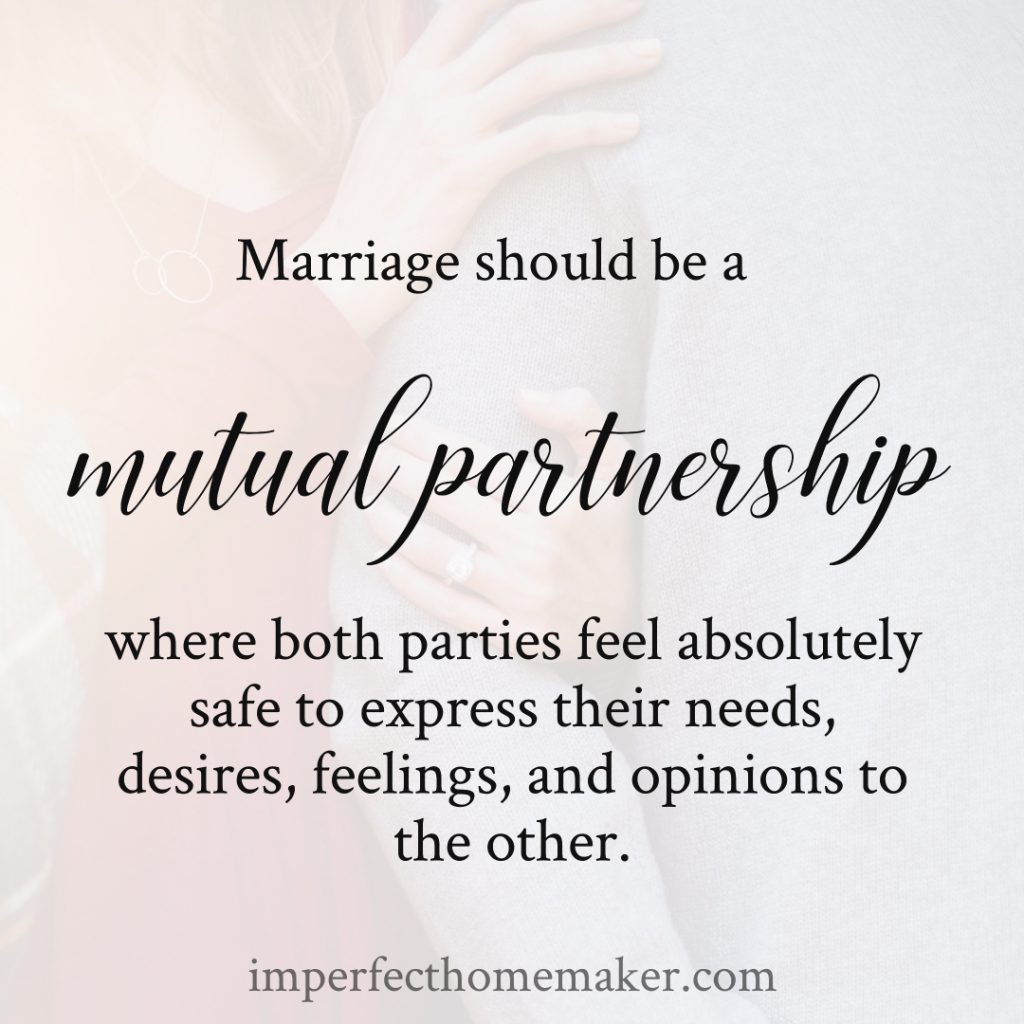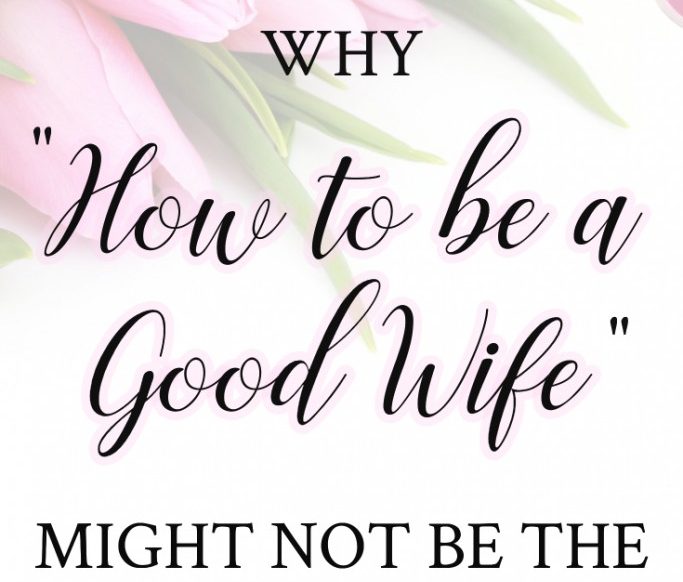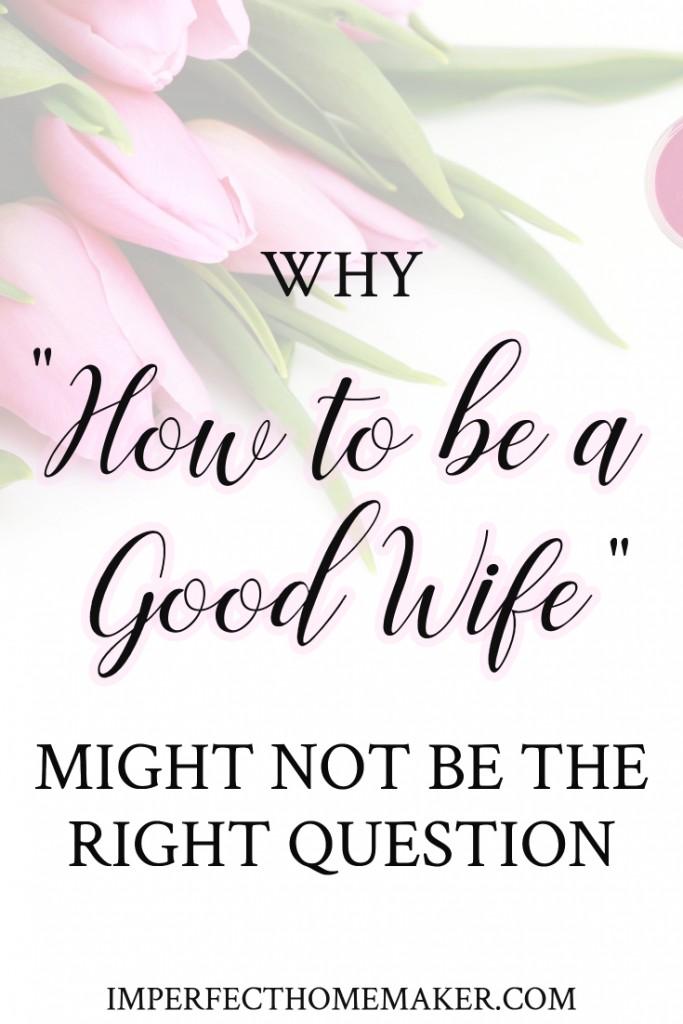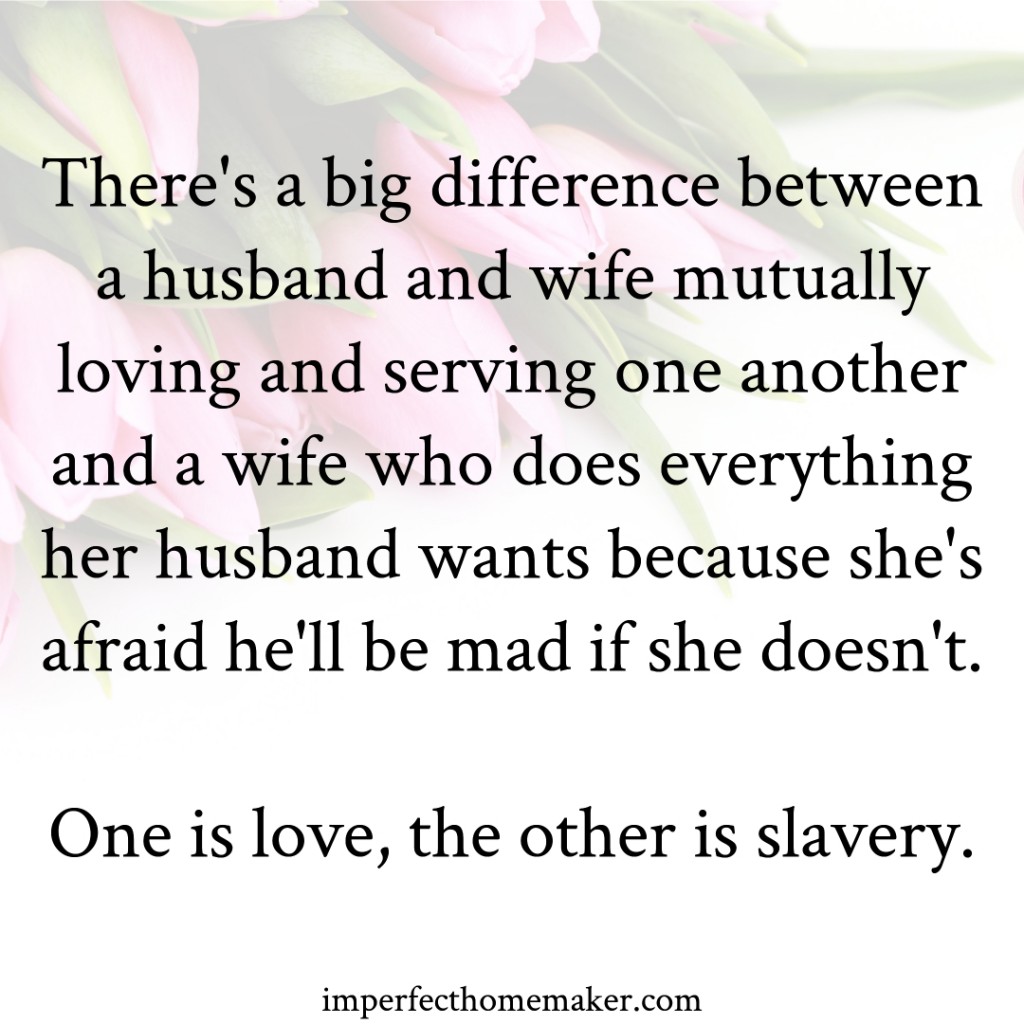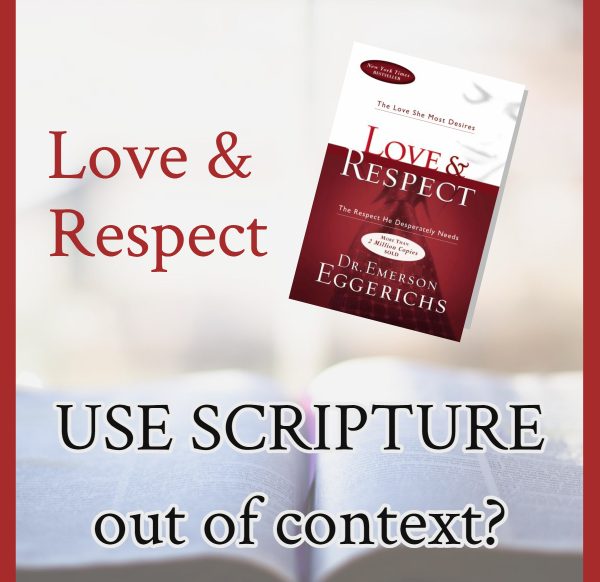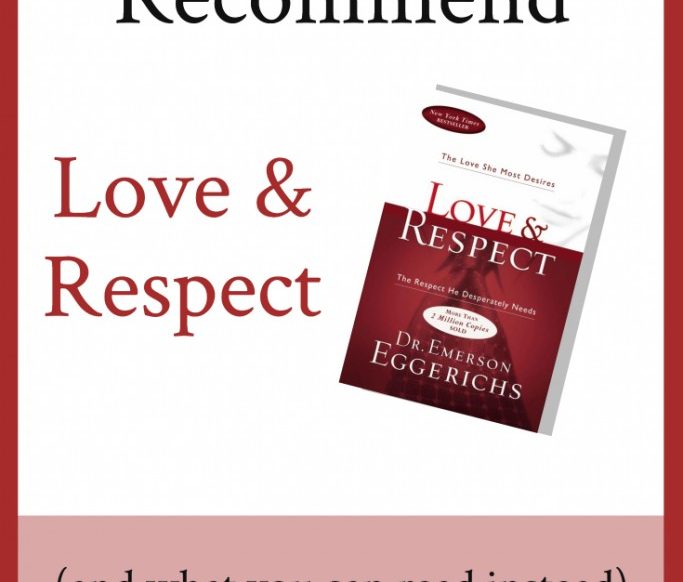What Does it Mean to Have a Voice in Your Marriage?
Why “How to be a Good Wife” Might not be the Right Question
“How to be a Good Wife” is a question I sometimes receive here, and it's a question I see come up frequently around the internet.
Generally I explore that question one-on-one with the person at the other end of my inbox. I find out more about why they're asking, and we have a conversation about it that is relevant to the details of their specific situation.
But for those who are searching publicly available books and articles to find answers to their pressing question about how to be a good wife, I want to address some of the common themes that I see regarding this question.
Basically, I have two main points:
- Sometimes asking how to be a good wife is a great question to ask!
- Sometimes asking how to be a good wife is not the right question for your situation.
So let's dive into what I mean, ok?
When I was first married, being a wife was all new to me. I loved my husband so much, and I wanted to be the best wife I could be for him. He also wanted to be the best husband he could be for me, and we set about learning and growing together as a couple. We would talk about our likes and dislikes, and we would ask each other questions to learn more about how we could better serve the other person.
Because we loved one another, we wanted to please one another, and we learned everything we could about how to best do that. As the wife in the relationship, the question from my end was how could I be a good wife, and it was a good and healthy question to ask myself.
Yet even in a relationship where both of us were mutually loving and serving the other, I discovered a pitfall where the question of how to be a good wife could be taken too far. This pitfall came in the form of books and articles that are written to Christian wives. Now, I'm not saying that no one should ever write books or articles for Christian wives (it's what I'm doing right now, after all!) But what I discovered was that many of these Christian women's books go far, far beyond what the Bible actually teaches. Instead, they offer up collections of opinions that pass as “Biblical” teaching but are really man-made (or woman-made) rules about things that a good wife should do.
My husband and I are both book lovers, and we hadn't been married long when we came across a thrift store that had piles and piles of books that were all free! Wow! I was in heaven! Because the books were free, I was pretty quick to add anything to my cart that was by a Christian publisher, whether I was familiar with it or not. I figured if they weren't any good I could toss them later.
My husband was the bread-winner and I chose to be a stay-at-home wife. This meant that before I had children I had lots of time to read. But I wasn't just sitting around relaxing; I was reading all the books from that thrift store that teach women how to be good Christian wives. I wanted to learn as much as I could! But boy, did I have a rude awakening. These books weren't teaching how to be a good wife at all. Their implicit and explicit messages were teaching that men have “needs” and that wives were created to meet them. They were teaching that to be a good wife meant submitting to your husband even when he is harsh, cruel, and selfish (aka letting him always have his way like a spoiled child.) That isn't what it means to be a good wife; that is enabling your husband's sin and selfishness. (I just read this fantastic Facebook post that speaks more on this subject.)
I haven't picked up any of those books for many years, but recently I've pulled some of them back off the shelf because I get messages sometimes asking me what I think about some book or another. Inside I find the scribblings I wrote all those years ago refuting what the author had said. I wrote things like, “That's not in the Bible, but they keep using the words ‘biblical advice', which puts a guilt trip on the reader, making them feel that if they don't follow this man-made list of ‘rules for good wives', they'll be disobeying God!”
There were plenty of books with overt messages teaching women to cater to selfish, domineering husbands. But perhaps even more dangeous was the subtlety of all of the books with more palatable, yet still wrong, messages about what it means to be a good wife. These are everywhere. In bygone years, I have written such articles myself right here on this blog. These are the articles and books that tell you that you need to keep your house cleaner. That you should be a wise steward of your family's money. That you should make your home warm and inviting. Don't get me wrong – these things are not bad. But what I've seen in my own life and many other women I know is that the cumulative message of all of these books and articles is that being a good wife is about what you do.
However, being a good wife isn't about doing more, more, more.
Being a good wife is about who you are. The point is not to “do all the things” in order to build up your home. The point is that when you seek to be a wise woman, the natural result is that your home will be built up.
Ok, so far I've addressed that asking “how to be a good wife” can be a good question when the dynamic is that both the husband and wife are simply seeking to know how they can best love and serve one another.
I've noted that even with this dynamic you need to be aware of the pitfall of thinking that your value as a wife is found in the things that you do.
Now I want to address a different marriage dynamic in which many women find themselves.
This is the dynamic where the husband believes he is king of his castle and that his wife exists to serve him. In this relationship, a husband has expectations for his wife that can extend into any area(s) of her life. For example:
-What she cooks
-The way she cleans
-The way she dresses
-Who her friends are
-Which groceries she buys
-Where and when she goes places
-How she manages her health, weight, or fitness
-And so many more.
These expectations may or may not be verbalized, but the wife in this relationship knows that her husband expects her to behave a certain way. How does she know this? Because when she does not meet those expectations, there are negative consequences.
Over time, she recognizes a pattern that when she has not pleased her husband, she may receive some form of the following:
-Silent treatment
-Withholding intimacy or on the flip-side, forced sex
-Verbal abuse or put-downs
-Rage
-Intimidation and threats
-Physical aggression – punching holes in walls, breaking things, driving dangerously
-Physical abuse (note: he doesn't have to punch you for it to be physical abuse. Examples: pulling hair, dragging, grabbing, pushing, spitting, blocking in a room, pinning against a wall)
My friend, let me put it honestly. If you are in a relationship like this, you are experiencing what is called coercive control. A husband who acts this way is abusive. I strongly urge you to read more about what coercive control looks like here.
I have received messages from wives in this type of relationship, and the question is almost never, “How can I stay emotionally and physically safe?” The question is usually, “How can I be a better wife?”
See, a husband who believes he is entitled to having everything he wants, when he wants it, the way he wants it, will always use manipulative words to turn everything he doesn't like in life to be his wife's fault. At first, she will find ways to explain hurtful situations to herself when they happen. “Oh, I must have misunderstood him. Surely he couldn't have meant it that way, right?” But as time goes on, hurtful things continue to happen, and every time he tells her it's her fault, she begins to wonder if maybe she really is the problem.
“Maybe I just need to be a better wife.”
“If I could just be:
-More respectful (which to an entitled husband just means more catering to whatever he wants)
-More organized
-A better cook
-Better at managing my time
-More sexy
-etc.”
“Maybe he has a reason to be irritated with me, and I just need to get my act together as a wife.”
This dynamic is when asking how to be a good wife is not the right question.
If your husband is controlling, selfish, a chronic liar, or has a pattern of engaging in otherwise hurtful behavior, you are not the problem.
I'm not saying that you've never sinned or never made a mistake as a wife.
I'm saying that searching for ways to be a better wife will not make your husband stop being selfish, controlling, deceptive, and hurtful to you.
If the above relationship sounds like yours, it's time to stop asking how to be a good wife, and it's time to start asking what you are going to do to get physically and emotionally safe.
And if you are the friend of someone who confides in you about her husband's chronic mistreatment, don't give her books about how to be a better wife.
There's a big difference between serving your husband because you want to, and doing it because he's going to be mad if you don't.
One is love, the other is slavery.
When your solution to a demanding and entitled husband is to work harder and harder to meet his expectations, you are catering to his ungodly belief system — the belief that all of life revolves around him, and that you are responsible for his happiness. He is idolizing you as the source of his happiness and fulfillment, and his goal, although he might not even realize it, is for you to idolize him by centering your all of your thoughts and actions around appeasing him like an unpredictable god.
So, if “How to be a better wife” isn't the question to be asking in a marriage like this, what can you do?
Here are some excellent resources that can help you get started sorting out your situation and deciding what your next step should be:
The Emotionally Destructive Marriage by Leslie Vernick
Is it Me? Making Sense of Your Confusing Marriage by Natalie Hoffman
Lots of Resources at Hope for Hurting Wives
If you'd like to talk with someone, you can request an advocate from Called to Peace Ministries.
It is possible to be a good wife and to be safe at the same time.
It is possible to love your husband well while also saying no to his sin and selfishness.
Summary:
1. Asking yourself how to be a good wife is a great question in the context of a mutually loving, serving relationship.
2. Asking yourself how to be a better wife is not appropriate if your focus is on doing rather than on being. (Read this post for further explanation.)
3. Asking yourself how to be a better wife is not appropriate if your purpose is to try to stop your spouse from mistreating you, lying to you, neglecting you, or being hurtful to you in any way.
4. Asking yourself how to be a better wife will not change the wrong beliefs of your spouse.
5. If you recognize a pattern in your relationship where you keep thinking that if you were only ______ (more organized, a better cook, quieter, thinner) then maybe your husband wouldn't be in such a bad mood, there is hope and help for you (but it won't come in the form of a book teaching you how to do those things.) I highly recommend speaking with a trained advocate one on one who can help you assess the seriousness of your situation and help you determine your course of action.
If you're curious to learn more about what an abusive relationship might look like in a home that is supposed to be Christian, and want to learn how you can help someone in this situation, sign up for the email series below:
Why is Marriage So Hard?
Although I don’t know the intimate details of everyone’s unique circumstances and would never pretend that I know all there is to know about marriage, I would like to address the question, “Why is marriage so hard?”
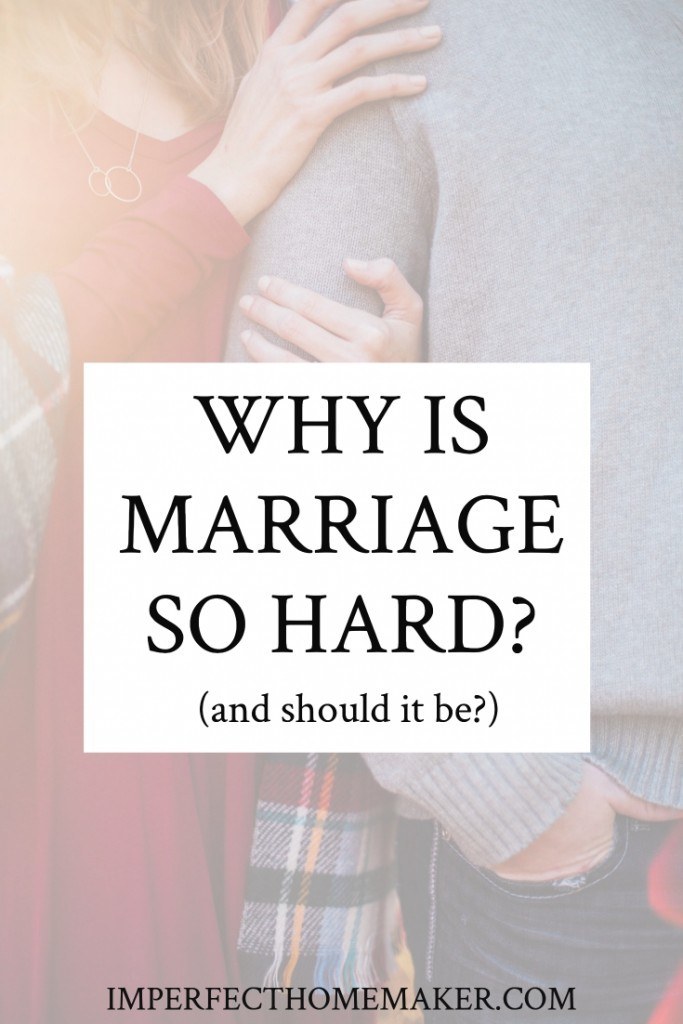
Why is it important to talk about marriage being hard?
There is a prevailing sentiment that circulates in conversations about marriage, especially in a Christian context, that marriage is hard. For most people it seems to be a given that marriage is hard. I polled my followers on both Facebook and Instagram, and the vast majority said they agreed with the statement that marriage is hard. I think one reason this thinking is particularly prevalent among Christians is that no one wants to be that person who “takes the easy way out.” Most Christians believe that divorce is never an option, so they remind themselves and others that “marriage is hard” (and often add “but so worth it.”)
But the reason we need to talk about this is that the definitions different people have of “hard” can vary widely.
For one person, they may be thinking that it’s hard to hold in critical words when their spouse puts the toilet paper roll on the wrong way. Maybe it bothers them a lot and they have a feisty personality, and they’ve had to work hard to respond to little irritations with grace. For another person, they may be thinking that marriage is hard because life keeps them so busy that it takes a lot of effort to regularly make time to connect with their spouse on a deep level.
These are totally legitimate reasons to feel that marriage is hard, and there definitely is a certain amount of effort required to build up and maintain habits that make for a healthy marriage.
However, there are a great deal of people who are not hearing anything like what I’ve just written when they hear that marriage is hard. Many people are being horribly mistreated and abused by their spouse, and they do not even realize it because they have always heard that marriage is hard.
Consider some of the following:
- “I was constantly walking on eggshells. I bent over backwards and tolerated things that most people would not have to deal with because I thought marriage was supposed to be hard.”
- “I was always told that marriage takes sacrifice. So when my husband was using pornography and verbally abusing me, I kept sacrificing and giving him more and more of myself. I was told that if he cheated on me he would come back to the haven that I’d created for him.”
- “I should have seen the red flags of abuse, but because I had always heard how hard marriage is I thought it was normal. I thought it was all my fault because marriage was supposed to require a lot of sacrifice.”
- “My husband treated me horribly and cheated on me. I spent the whole marriage working hard to sacrifice my own selfishness so we could have a good marriage.”
Do you see why this is so important to discuss? The number of women who tell me that all the books and sermons about marriage they’ve read/heard only made it more difficult to recognize the abuse is astronomical. I believe that most people who write and speak about marriage mean well, and from their perspective they’re not speaking to someone in an abusive situation. But when you’re in the midst of abuse, it’s very confusing (purposely so on the part of the abuser), and the victim does not realize that what she is experiencing is abuse. She only knows that…
“Marriage is hard.”
“You have to sacrifice.”
“Marriage requires lots of forgiveness.”
“You have to set aside how you feel and keep your commitment.”
I don’t want to be a part of contributing to an abuse victim’s further confusion and entrapment, do you?
So, when we make statements about marriage being hard, do you think we could all work together to define exactly what we mean?
In no way am I discounting the particular aspects of marriage that you have truly found hard. I’m not asking you to minimize your own experience or telling you not to say that marriage is hard when you really have found it hard. But, can we be sure to clarify that “life is hard, and navigating those hardships as a team takes work, but it should never be your spouse who is causing your life to be hard”?

Did you know that 1 in 4 women will experience domestic abuse in their lifetime? And did you know that those statistics are the same among churchgoers as among those who do not attend church? Abusers love to infiltrate the church and put on a mask of goodness because church people are so quick to believe the best about others and readily forgive offenses. But this means that the women you associate with in your ladies Bible studies, the ones you chat with in the restroom, and the ones sitting near you in the service may be trapped in an abusive relationship. Rarely do people speak of abuse and teach others how to recognize it. It’s not usually on the radar as something that needs to be said in church; it’s more often perceived as something that occurs “out there” in a bad neighborhood somewhere. So when those godly women in our church who have been targeted by an abuser come to our Bible studies and listen to our conversations, they only know that “Marriage is hard.” They don’t know that “Marriage shouldn’t be hard because your spouse makes it hard.”
So why is marriage so hard? Let’s look at some examples of real, legitimate reasons a person might find marriage hard:
- Some seasons of life are highly stressful for both spouses (loss of job, illness, grief, etc.). It takes extra work to remain gracious when we feel emotionally drained.
- Misunderstandings take place, and it takes work to communicate and find out where things went sideways.
- Life is busy. It takes work and planning to go on dates or spend dedicated time together.
- Some people enter marriage expecting a fairytale life which doesn’t exist. When life isn’t endless romance, but instead includes bills, housework, and waking up to a bedhead spouse, they find themselves resentful of the life they now live, and have to work to process how they feel and come to terms with reality.
- Past trauma can make it difficult to trust your spouse, even if they are a trustworthy person. It takes work for the injured spouse to overcome those emotions, and it takes patience and grace on the part of the other spouse.
- Everyone makes mistakes, and it can be hard to swallow our pride and apologize when we’ve said something unkind or acted selfishly.
- What you thought was a given due to your family background (e.g. the table will always be formally set for family dinner, and we will always use proper manners at the table) may be the opposite of what your spouse thought was a given (this is our safe place to relax; let’s use paper plates and not be so formal with our manners.) It takes work to compromise on situations that aren’t harmful to the other person, but can damage the relationship if we always insist on our own way.
- Marriage can be hard when one spouse is chronically ill and the other has to carry a larger portion of the load.
All of these hard things can be overcome when both spouses are humbly submitted to the Holy Spirit’s working in their lives. They can face the misunderstandings, the stresses of life, and the little annoyances together. But it’s so important that we highlight the fact that the hard things in marriage have to be overcome together as a team. One person cannot single-handedly keep a relationship strong — a relationship takes two.

On the flip side, if any of the following examples are reasons why you feel like your marriage is hard, it is important for you to realize that these are NOT normal or legitimate reasons for your marriage to feel hard:
- Your spouse expects you to keep everything perfect at home but doesn’t do their part to help
- Your spouse tells you that you are being lazy when your work doesn’t meet their criteria
- Your spouse treats you like a child, inspecting and criticizing everything you do
- You are expected to take the blame for your spouse’s bad behavior (“I wouldn’t get so angry if you would just ____.”)
- Your spouse twists every discussion around, confuses you, and makes you feel unsure of reality
- You discover lies and deception on the part of your spouse and feel that you are supposed to just forgive and move on
- Your spouse is addicted to pornography
- Your spouse blames childhood trauma or an alcoholic father for their current bad behavior
- Your spouse requires you to have permission to go places or spend time with friends
- You don’t feel to safe to say what you really think or want
- You have to ask permission for money to buy household necessities. You find it difficult to prepare meals with so little grocery money, yet your spouse always has enough money to buy the things they want.
- You are distressed at the cruel way your spouse treats your children or pets
- You feel pressured to have sex with your spouse any time he wants it or in ways that make you feel uncomfortable
- Your spouse makes mountains out of molehills. For instance, if everything is not 100% spotless at home they will be enraged.
- Your spouse repeatedly hurts your feelings, puts you down, belittles you in public or in private, expresses disapproval about everything you do.
- Your spouse regularly makes decisions that impact you without regard to how you feel about them
- Your spouse accuses you of being selfish or ungrateful when you try to address a problem or express a need
- Your spouse does not want to spend time with you; never wants to hear about your day; is not interested in your life or your feelings
- Your spouse does not protect you when you are vulnerable. You are still expected to keep up with housework even when sick or in pain.
This is destructive behavior on the part of your spouse. If your marriage feels hard because of your spouse’s destructive behavior, scroll to the bottom of this post for some resources that will give good advice for your situation.
For those who do not find marriage hard due to any of the reasons above, let’s talk about ways that we can discuss the reasons why marriage is hard while also being extra clear about what we mean.
Perhaps we could start by using the word “but…” in our conversations.
- Marriage is hard because miscommunication happens sometimes, BUT we resolve it in a healthy way.
- Marriage is hard because there are a lot of real-life responsibilities that have to be taken care of, BUT we work together as a team to get them done.
- Marriage is hard because life throws hard things at you, BUT we support each other through life’s seasons of stress and grief.
- Marriage is hard because it’s difficult to make time to connect with each other, BUT we enjoy being involved in other’s lives and it is worth the extra effort.
- Marriage is hard because it requires me to give up some things I want for the good of my spouse, BUT my spouse does the same for me. We both look for ways to serve each other.
- Marriage is hard because sometimes my spouse unknowingly hurts my feelings, BUT I feel safe to discuss it and know I will never be blamed for being “too sensitive.”
- Marriage is hard because it requires work to develop tools for being an emotionally healthy person, BUT we both take responsibility for doing that for ourselves. I am not required to carry the emotional load of us both.
- Marriage is hard because I have past trauma that makes it hard to trust people, BUT my spouse always tells me the truth and has shown by their actions to be a trustworthy person.
- Marriage is hard because sometimes we do or say unkind things, BUT we apologize to each other and make it right.
- Marriage is hard because sometimes we have strong opinions that are opposite of our spouse’s, BUT we both work at seeing things from the other’s perspective and don’t insist that the other person adopt our viewpoint.
If the main thought you have about marriage is how hard it is, something is wrong. Marriage is intended to be a picture of Christ’s relationship to the church, and should therefore be a safe place, full of joy and blessing.
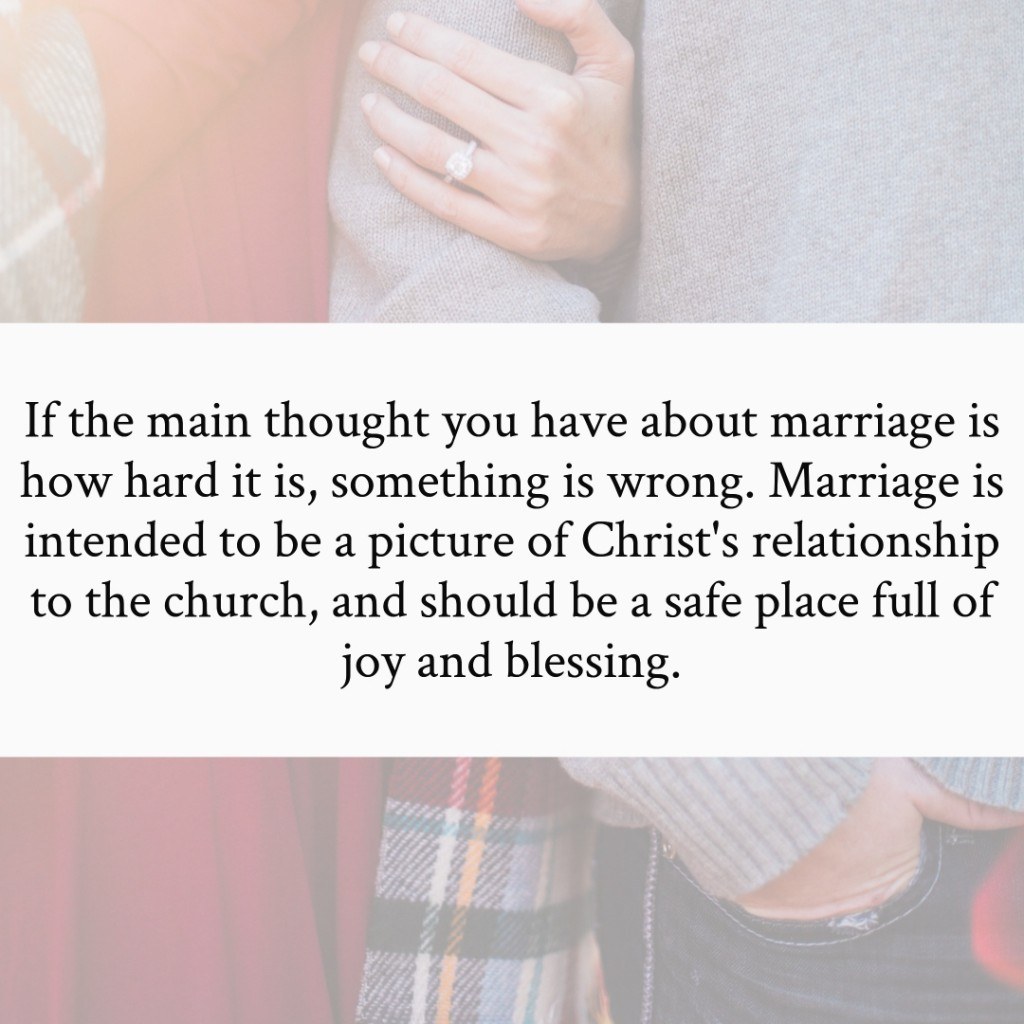
In the words of some of my friends who are abuse survivors:
- “Two are better than one. If being part of the two actually makes your life harder then what’s the point?”
- “Life throws a lot at you, but marriage should be a team working through things together. If the team itself is hard, the team might not be working.”
- “For better or for worse means no matter what life throws at us, not no matter what you do to me.”
- “Life is hard. Marriage should not make it harder.”
- “Hard is not the same thing as harmful.”
- “Every marriage has circumstances that you will have to work through, but it should never be your spouse who is causing the hardships.”
- “The hard work of marriage should be about becoming who God wants you to be, not about putting up with your spouse’s bad behavior.”
So the answer to the question “Why is marriage so hard?” is that we live in a world that is broken down by sin. We have unrealistic expectations about life, we are sometimes selfish, and we have to deal with many hardships that come along as the result of an imperfect world. But marriage should never be hard because of the destructive behavior of our spouse.
Can we work together to make sure we are very clear in the way we speak of marriage?
So many who heard the conversation about marriage being hard testify that instead of knowing the blessing of a God-honoring partnership, they experienced this:
“My love for God and desire to serve and sacrifice even when it was hard kept me in a destructive marriage for too long.”
“I didn’t recognize the abuse in my marriage because I thought it was normal for things to be that hard.”
“I went into marriage expecting to suffer as a direct result of my spouse. I thought I was supposed to suffer.”
“I was led to believe the abuse was my fault, and that I had the ability and responsibility to change him by loving him more, meeting his needs better, and working even harder around the house.”
“I couldn’t even imagine marriage being something good. I thought it was supposed to be terrible.”
“I was taught that it was wrong to say anything bad about my husband, so when things were hard because of him, I went along with the idea that it was because marriage is hard.”
How do you think we can change the way we speak about the realities of marriage? How do you think we can address the genuinely hard aspects of marriage while making it clear that marriage itself should be a blessing and a joy; not a hardship to endure?
Resources for those who wonder if their experience of hardship in marriage is beyond the range of normal:
(Disclosure: some of the following are affiliate links.)
The Emotionally Destructive Marriage by Leslie Vernick
Is it Me? Making Sense of Your Confusing Marriage by Natalie Hoffman
While you wait for your books to arrive, you can spend some time taking this quiz and watching this webinar.
Love & Respect is Based on Illogical Assumptions about Gender
This post is part three in a series that describes some of the problems with the book Love & Respect. As you will find in the introductory post of this series, this is not intended to “bash” any author or to condemn anyone who read and enjoyed it. Instead I aim to answer questions I have received, and to help you understand how this book has harmed many people who read it. When you are aware that a book has the potential to harm someone, my hope is that you will either encourage your friends to skip it or to make them aware of the potential issues before they read it so that they do not come away with ideas that could be damaging to them or their spouse.
As I have already pointed out in part one and part two of this series, I believe Love & Respect’s biggest fault lies with the fact that the author presents his theory (what he calls the “Love and Respect Connection”) as Biblical truth. The natural understanding is that if one chooses not to follow the author’s advice, they are really rejecting what God says.
Observe the following quote from Love & Respect: “Men’s deepest need is respect and women’s is love. When your husband makes you feel unloved or your wife makes you feel disrespected, that is because you have not met this deepest need of theirs. Therefore, husbands love your wives (so you can meet her deepest need,) and wives, respect your husbands (so you can meet his deepest need.”) To say that this is what God said in Ephesians 5:33 is to add a whole lot to the word of God, and to make a whole lot of assumptions.
If one looks closely at the endnotes of the book, he will find the author’s admission that “The Love and Respect Connection is what the author infers from Ephesians 5:33 and is not its actual theology. Although he paid lip service to acknowledging that this “Love and Respect Connection” is only his theory, two sentences later he goes right back to presenting his theory as scripture: “Ephesians 5:33 reveals that a wife needs love and a husband needs respect, and when those needs are unmet each spouse reacts at some level” (from chapter one end notes). In the front matter of the book he promises his readers that couples who “submit themselves wholeheartedly to this biblical design for marriage” will have “limitless” potential for improving their marriage, I will not rehash the many other ways that he misled his readers into believing the material was God’s word, but if you read parts one and two of this series you will see that this message pervades the entire book.
If the “Love & Respect Connection” is nothing more than a theory, and if the author knows that, why on earth does he make such bold promises that these rigid interpretations of each gender’s needs have “limitless” potential to improve their marriage? (I do not have an answer for that. Only he knows his heart, and I will not assign motives to him, but it is a tragedy that so many people have been hurt by placing their hope in what they were told was the Biblical “key to any marriage problem.”)
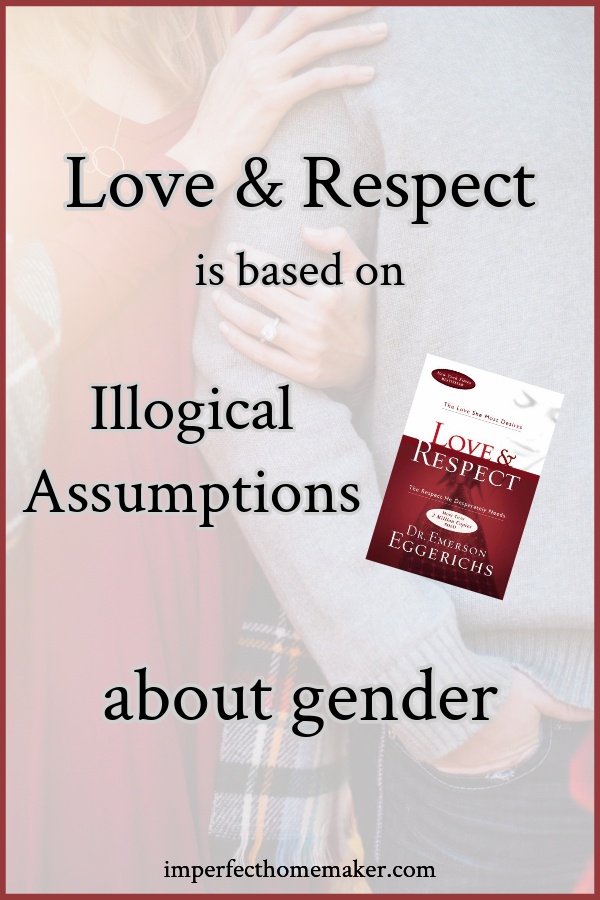
What about couples where the wife would much rather feel respected than anything else or the husband would rather feel loved?
Because the author has already presented his theories about each gender’s needs as if they are Biblical fact, there is no room for him to say that perhaps every individual is different in regard to their personal values, needs, and feelings. While there are no doubt generalities that will apply to most males or most females, there are no dogmatic rules regarding who would most like to feel loved and who would most like to feel respected.
The author addresses “exceptions to the Love & Respect Pattern” in Appendix D, and his explanation basically says that women who prefer to feel respected are actually at their deepest core seeking love and men who prefer to feel love are at their deepest core seeking respect. In other words, the author uses circular reasoning to hold to a dogmatic position of each gender’s needs. He states his conclusion without any evidence (men need respect; women need love), but when men and women try to assert that they feel differently, he refutes that by saying that they don’t actually feel differently because respect and love are the primary needs of men and women.
Some additional problems with asserting rigid gender stereotypes:
The author’s assertion that a man’s primary need is respect and a woman's primary need is love is based on two things. First, as has already been expounded upon, it is based on his own theory. Second, it is also based on a survey question used by Shaunti Feldhahn in her book For Women Only: What You Need to Know About the Inner Lives of Men.
In the survey, she asked 400 men which of the following, if forced to choose, would they prefer to endure: a) to be left alone and unloved in the world or b) to feel inadequate and disrespected by everyone. Out of the 400 men who answered the survey, 74 percent of them said that if they were forced to choose, they would prefer to be alone and unloved in the world (Love & Respect, p. 49).
The problem with drawing rigid conclusions about each gender from this survey question is a multi-faceted one.
1. The survey only asked 400 men this question. This is not nearly large enough of a sample size to draw any conclusions about “all men.”
2. The survey respondents were given a choice between which two things they would choose to feel, if forced. However, being presented with only two options and forced to choose between them does not necessarily lead to any conclusion that the choice one makes is their deepest need.
3. Shaunti Feldhahn's survey expert warned her that the men who responded to her survey may have a hard time choosing between the two answers. A pilot study of 10 men revealed that the men “fussed over” the question because “they did not feel the choices were different” (For Women Only, p. 23). In other words, how can one conclude that a man's deepest need is respect when he feels that feeling unloved and feeling disrespected are the same thing?
4. Women were not asked the same question. It is logically incorrect to assert that women's primary need is love when women did not even answer the question.
Along with making unsupported assertions that men's and women's primary needs are respect and love, the author of Love & Respect spends many chapters elaborating on specific types of behavior spouses can display that will make the other gender feel either respected or loved.
Although people write to him claiming that they feel differently than what he is saying (appendix D), he seems to dismiss their individual experiences in favor of holding to rigid gender differences.
Conclusion
I want to be clear that I am not dismissing the importance of either love or respect in a marriage. Neither am I dismissing the fact that there do seem to be general ways in which many women or many men think and act differently.
What I am saying, though, is that there is no Biblical or logical evidence that all men and all women have specific, gender-determined needs or that all men or women will interpret certain behaviors from their spouse the same way.
For example:
Some women may be the first to start a conversation when there is conflict while the man goes silent. In other cases, it may be the opposite.
Some women may enjoy having their financial or intellectual abilities appreciated while the man may not be talented in those areas and doesn't want his wife to pretend like he is.
Some women may have a higher sex drive while the man may not be interested as often.
I have no problem with an author presenting practical ideas that spouses can use to aid them in communicating with and understanding their partner. But as I have already made clear, the big problem for me all comes back to the author's presentation of the material – leading the reader to believe that his points are all clearly Biblical, then backing up those points with (illogical) “science”, both of which make the reader feel they are obligated to engage in specific behaviors that will meet their spouse's “deepest need.”
Instead of learning to interact authentically as unique individuals, spouses learn to alter their behavior to conform to a formula that has no firm Biblical or scientific foundation.
The result is that men and women with a destructive spouse suffer even further damage, and those with good-willed spouses learn to engage with their partner based on assumptions about them rather than on healthy communication.
To find all the posts in this series, click here: Why I Don't Recommend Love & Respect
Love & Respect Uses Scripture Out of Context
We have already seen in part one of this series that Love & Respect misuses scripture by leading the readers to believe that the author’s theory about men’s and women’s deepest needs is God’s unchanging revelation. (Read that post here.)
In this article we will take a look at some of the other ways that Love & Respect misuses scripture.
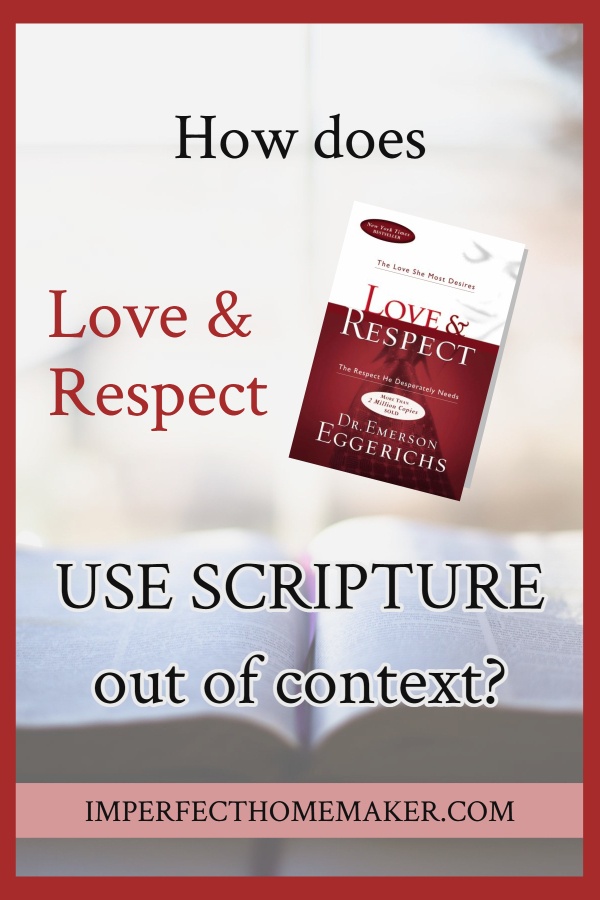
Giving the Benefit of the Doubt
Truly, I could nitpick all day at some of the “little” ways that the author uses scripture out of context to prove a point, but I do not feel that it is worth our time to examine every single one.
For one thing, I want to give the benefit of the doubt. Some of these instances of taking scripture out of context seem innocuous enough, and perhaps they were not purposely used to prove an extra-biblical point.
I have not bothered to include any of these as I do not feel it necessary to split hairs about every little thing.
Subtle, Yet Problematic
Other examples, though they may seem harmless on the surface, are more problematic when one takes a closer look.
Take this section for instance:
“A husband is geared to hear the command, ‘Take courage…be men and fight’ (I Samuel 4:9)” (p. 50).
Knowing that the author takes liberties with declaring his own ideas as Biblical truth made me curious to look at this closer too.
Along with his theory that men’s primary need is respect and women’s is love, he presents supporting theories throughout the book about other ways that men and women are different. God made males and females, and I believe he created them distinct from each other on purpose. But the author takes this idea to an extreme and lays out intricate descriptions of how all men and all women are wired, and quotes scripture verses to support these descriptions. The understanding is that when a wife learns these unquestionable truths about how her husband is wired and acts accordingly, this will make him feel respected. And when a husband treats his wife according to how she is wired she will feel loved.
Now, is it important for husbands and wives to know what makes their spouse tick? Will they be much less likely to unintentionally offend if they know the other might interpret what they say differently than they intend it to mean.
Certainly so; therefore it’s important to learn good verbal and non-verbal communication skills.
But instead of teaching spouses to learn to appreciate each other’s individual differences, the author of Love & Respect expends a great deal of effort to prove very specific things that all men and all women need, and lays out specific male/female formulas they must follow in order for their spouse to feel understood.
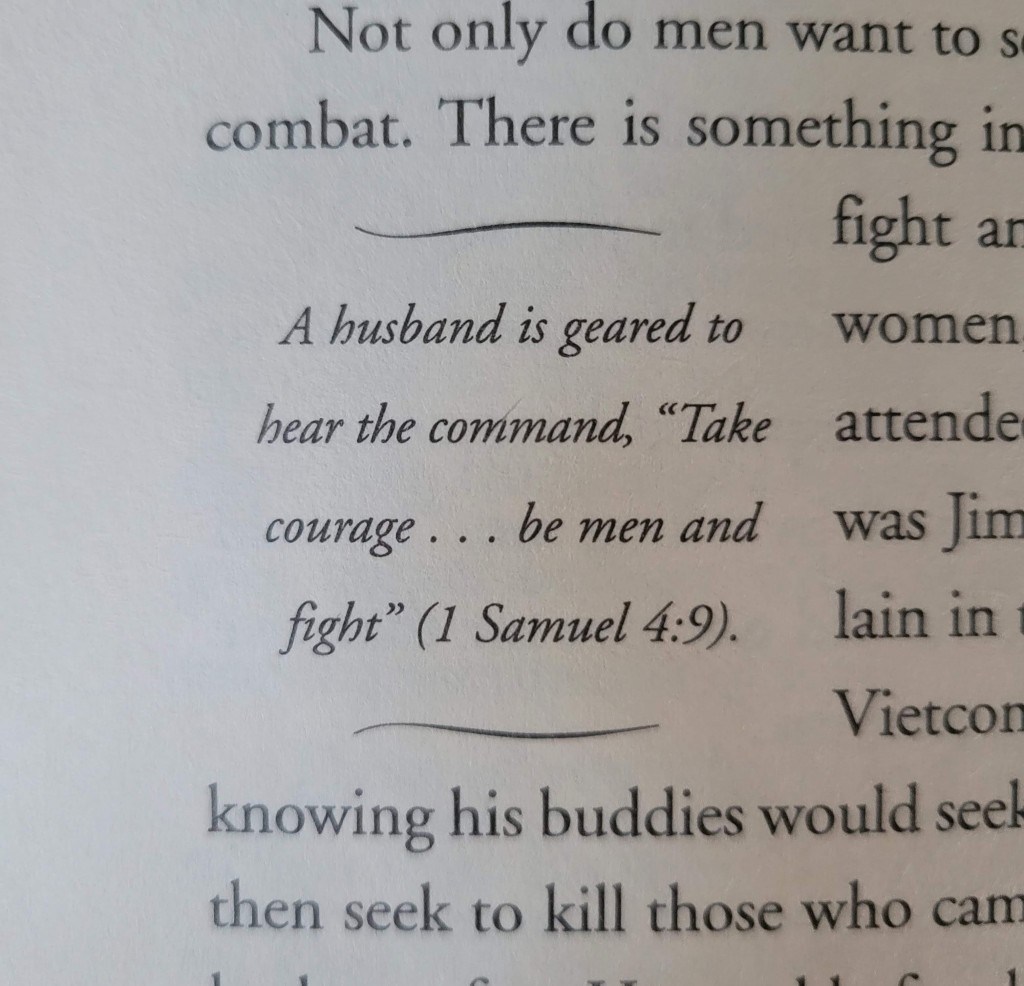
My objection to this part about men being geared to fight is not so much about debating whether being suited for combat is a male/female difference. My objection has a whole lot more to do with the context of the entire book in which rigid gender needs are “proven” from out-of-context scripture verses.
Let’s take a closer look at I Samuel 4:9. In this passage, the Philistine army had battled and defeated the Israelite army. The Israelites determined that their best course of action was to bring the ark of the covenant to their encampment. When the Philistines realized that the ark had been brought to the Israelite army, they became afraid because they believed God himself had come into the Israelite’s camp. They knew that the God of the Israelites was powerful enough to defeat them. In the midst of their fear they said to one another that they must be strong like men and fight, lest they become servants to the Hebrews.
This account of a battle between the Philistines and the Israelites has nothing to do with proving that men are “geared” to fight in combat. But this type of proof-texting occurs frequently throughout the book, and if one does not take the time to look up each scripture verse in its context, one will take the contents of the book as Biblical truth. But placing scripture references in parentheses next to a statement does not mean it is Biblical truth.
The previous example is just one of many where the author misuses scripture by trying to extract something in order to assign labels to each gender.
Without these fixed gender labels regarding what each gender’s deepest needs are and how each gender views the world, the book falls apart.
As I noted in the article about Love & Respect equating theory with scripture, it is not wrong for an author to present his theories. He could have even presented his gender labels as “many women need…” or “a lot of men feel that…” and he would not have been dishonest.
But to misuse scripture in order to present these gender labels as gospel truth, and to form an entire one-size-fits-all formula around them is misleading at best.
He does not provide any doubt that this strict presentation of gender labels is purposeful. Statements like these appear throughout the book:
“Paul is clearly saying that wives need love and husbands need respect” (p. 15).
“Peter is definitely talking about unconditional respect” (p. 18).
“To speak his language, remember: ‘the wife must respect her husband’ (Ephesians 5:33 NIV)” (p. 66).
“Ephesians 5:33 reveals that a wife needs love and a husband needs respect, and when those needs are unmet each spouse reacts at some level” (chapter one endnotes).
Pink and Blue Sunglasses
As yet another example of how the author tries to proof-text men and women into very specific boxes, he goes on to use I Peter 3 to construct an entire section about pink and blue sunglasses, meaning the different ways in which men and women see the world (p. 32).
But First Peter 3 has nothing to do with pink and blue sunglasses. If he would like to try to help husbands and wives understand that their partner may be looking at something from a different perspective than they are, he should feel free to do so, but to construct this advice around an out-of-context verse is careless and unnecessary.
The point of I Peter 3:7 is not at all to point out that men and women wear blue and pink glasses, respectively. It’s a command to men to honor their vulnerable wives. While there are some generalities that apply to most men or women, every individual sees things differently. If two people of the same sex are living together as roommates, there will occasionally be conflict between them because they will not always see eye to eye. This is not a unique problem only between males and females, and the answer to interpersonal conflict is much more complex than using formulas of what “all males” or “all females” need.
Presenting these gender-based formulas as Biblical does a disservice to couples because it leads them to believe that they are guaranteed to work. It is unfair for an author to lead wives to believe that it is a Biblical guarantee that men “need to feel respected even more than to feel loved” and that “respect is the key to motivating a husband” (p. 49-50) when it is merely his theory and not actually a guarantee.
Wives Ask to Be Unloved?
“Wives virtually ask to be unloved when they ‘look down on their husbands’ (Esther 1:17 NIRV)” (p. 59).
Here is another concept this author teaches that he has extracted from a verse out of context. Let’s take a closer look at what this verse is about.
In Esther chapter 1, queen Vashti refuses the king’s command to come show off her beauty to the royal court. The king became angry and asked his advisors what should be done to Vashti. The advisors told him that there needed to be repercussions for Vashti’s refusal of the king’s command; otherwise all the women will hear about what the queen has done. Then they won't respect their husbands” (Esther 1:17 NIRV).
This passage has absolutely nothing to do with wives “virtually asking to be unloved!”
To even imply that if a wife is unloved by her husband it is because she “asked for it” is at best unfair and in many scenarios dangerous.
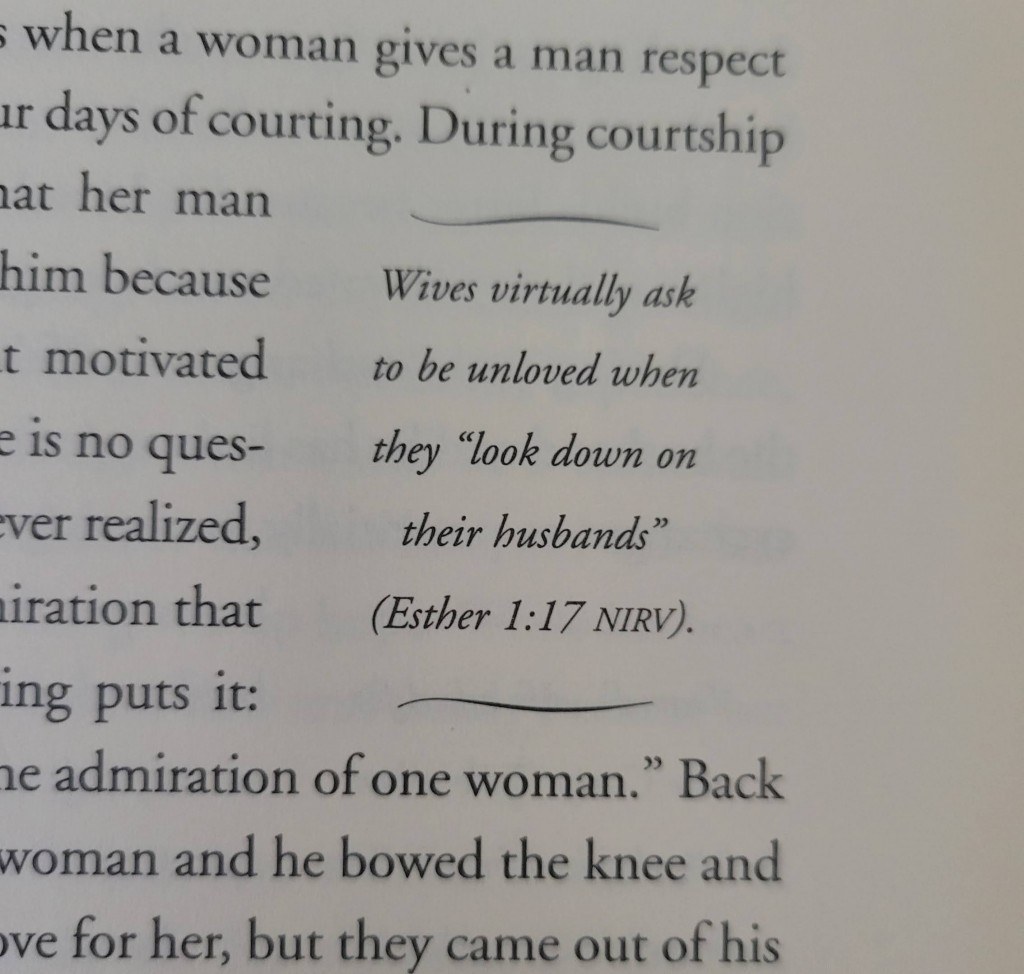
Conclusion
From my notes that I took as I read the book, I compiled a list that contains many more examples of the author’s use of proof-texting in order to present his concepts as Biblical truth, but I believe I have shared enough already to make my point.
Even if I agree with much of what an author says, I am not okay with that author leading people to believe that his theories are Biblical truth when what he has actually done is to manipulate the scripture in order to make his points.
The disastrous result of laying an impossible burden on people and claiming it is the “Biblical way” is illustrated by this heartbreaking comment I received from a lady named Wendy:
“Coming from someone who lived in an emotionally abusive marriage for over 16 years, this book encouraged my husband’s abuse and only made me feel that apart from perfection I was to blame for the abuse I was suffering…I can tell you the damage is huge to a spouse who has a heart for God and is in a marriage with a narcissist. Perfection wouldn’t have been enough. I was on one of the love and respect podcasts anonymously and was praised for my effort to continue to respect in spite of obvious abuse. Mr. Eggerich stated that if my husband didn’t change…I was to suffer for Jesus and continue to give and respect. 16 years later I found out my husband was living a double life of homosexuality, porn addiction, adultery with both women and men, and I was told he was a covert narcissist. My life was endangered, my children were in danger…if you are in a marriage with an abusive person…this book will only enable their behavior…I am grateful I am alive and my children are safe, but it was not without consequences.”
I am not okay with what happened to Wendy in the name of the “Biblical principles” taught in this book.
I am not okay with someone using scripture out of context to convince women it is their responsibility to motivate their husbands to love them.
I am not okay with an author telling women that if their husbands don’t love them it is because they “asked for it.”
I am not okay with an author telling a woman that if her husband mistreats her, she can just respect him more and it will make him love her.
That is my reason for this series. Too many people are suffering as the result of being encouraged by their pastors or counselors to read this book. It is promoted as Biblical and something that will revolutionize a marriage. And yet, it is not Biblical, and the only revolutionary change it has brought to many people’s lives is destruction.
Love & Respect is a best-selling book. Out of 33 million titles on Amazon, it ranks as of this writing at number 1,726. There is no telling how many thousands of people have read it and been harmed by their desire to obey what they were told was Biblical truth.
You can find the list of other problems with Love & Respect here. I hope you will pass this information on to others whom I hope will be spared from living a story like Wendy’s.
Why I Don’t Recommend Love & Respect
This week on Instagram I asked a question about whether my followers had ever read a Christian marriage book that harmed them in some way or that they recognized might harm others with unbiblical messages. One of the books that came up was Love & Respect by Emerson Eggerichs.
This sparked a good deal of interest. Love & Respect is quite popular, and many people had never noticed a problem with it when they read it. They wanted to know more about what ways this book could possibly harm people because that had not been their experience.
Up until a few years ago, I had never personally read Love & Respect. But when I became an advocate for Christian victims of domestic abuse, I became aware that many victims had suffered greatly due to the concepts taught in this book. So when I saw it at a thrift store I picked it up so I could see what it said for myself.
I fired up my computer while I read it, and whenever I saw something that was unbiblical or that sent mixed messages, I copied that section and wrote down my thoughts about it.
I did not have to get very far through the book before I concluded that it was not something I would ever recommend. But I wanted to be completely fair and make sure I had read everything in complete context, so I finished the entire book, including all the appendices and endnotes.
Now that I have finished, I’ve been able to look at all the notes as a whole and see that the problems fall into a number of different categories, which I will share momentarily.
I worked hard in this process to give the benefit of the doubt and to try not to read something into the author's words that was not there. While many parts of this book are problematic at face value, other parts could probably be defended by saying that the problem only lies within the reader's interpretation of them. I have done my best to be honest about the difference between the two. Nevertheless, both scenarios are present within this book, and I want to make my readers aware of both avenues of potential harm.
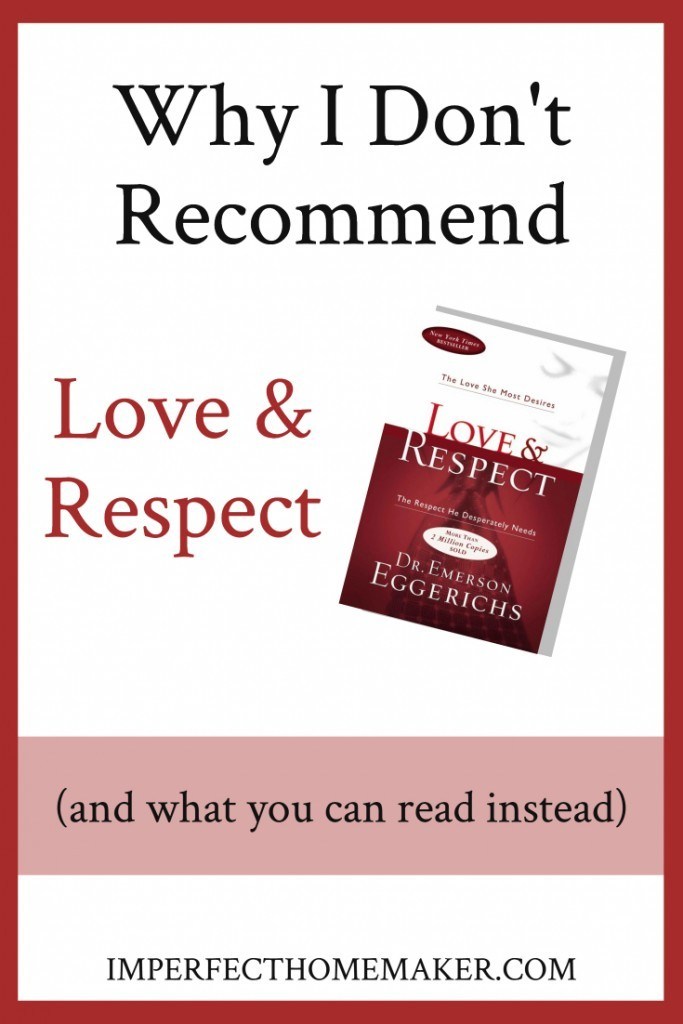
My Heart Behind This Post
But first, I want to be clear here. I am not writing this article to “bash” a book or its author. I understand that many of you have read the book and been helped by it, and I am truly glad for that.
I wish nothing but the best for you, and if you implemented ideas from Love & Respect that had a positive effect on your marriage, then I rejoice with you.
But it is this same fact of wishing nothing but the best for people which leads me to write about why I cannot recommend Love & Respect. Though you may have had a positive experience with the book, not everyone has had that same experience. Many people have been greatly harmed by reading and applying this book’s ideas. There are a lot of mixed signals within the book, and each person will pick up the signals that most strongly relate to them. So while one person may understand something in a helpful way, many others will understand it in a harmful way.
I fully acknowledge that many people may find this book helpful, but I am not willing to sacrifice an entire group of people as collateral damage.
So if you are in the category of people who have benefited from reading the book, may I ask one thing? May I ask that you not read this article as an attack on you or on a book that you liked? Rather than an attack against anyone or anything, this is intended to be a defense for those who have been hurt.
I hold nothing against you for reading and liking Love & Respect. I don’t think you are a bad or ungodly person because you liked it or were helped by it. Truth be told, had I read this book in the past, I most likely would not have thought there was a problem with it either. I would have read it through the lens of my own experiences, and would have formed some variation of the following conclusion: “My husband and I love each other deeply. But sometimes we misunderstand each other, and when we try to understand where the other is coming from it will enhance our communication and thus our marriage. The end. That's a simple enough message, so where's the problem?”
However, as I became exposed to perspectives outside of my own, and as I became aware that a great many people had been harmed as a result of following this book's advice, I knew that I had to examine it closely to see why that was.
This article is the result of that examination.
So before we begin I want to assure you once again that this is not about me trying to bash a book that you personally enjoyed. This is about my being thankful that you received help from it while also loving those who did not. Thank you for your willingness to consider a different perspective.
There is no way for me to thoroughly explain the reasons I don't recommend Love & Respect in just one blog post, so this article will serve as the “home base”, so to speak, and I will elaborate on each reason in its own post.
Here is the list of reasons I don't recommend Love & Respect:
1. Love & Respect equates theory with Scripture.
Theories are not in and of themselves problematic when people are aware that they are simply a theory. When an idea is presented as a theory people can try it knowing that it may or may not help them, and they are free to use or discard the idea as needed.
But a theory presented as “Biblical, unchanging truth,” communicates to Christians that it must be followed without question.
When this “Biblical formula” does not solve their marital problems, they will either conclude that God got it wrong (which I don't think most Christians would do) or they will conclude that they must be doing it wrong and they must try harder or be more patient. This does a terrible disservice to husbands and wives who only desire to please God in their marriage, but are led to believe they must follow a certain formula to do that. Many spend far too long in abusive situations, believing that this formula, which has “everything“ to do with what kind of marriage they will have (p. 15) will fix their problems in due time.
Read this post for further clarification about how Love & Respect presents theory as Biblical truth.
2. Love & Respect makes some of its main points with out-of-context scripture.
Along with his theory that men’s primary need is respect and women’s is love, he presents supporting theories throughout the book about other ways that men and women are different. God made males and females, and I believe he created them distinct from each other on purpose. But the author takes this idea to an extreme and lays out intricate descriptions of how all men and all women are wired, and quotes scripture verses to support these descriptions. The understanding is that when a wife learns these unquestionable truths about how her husband is wired and acts accordingly, this will make him feel respected. And when a husband treats his wife according to how she is wired she will feel loved.
Without these fixed gender labels regarding what each gender’s deepest needs are and how each gender views the world, the book falls apart.
As I noted in the article about Love & Respect equating theory with scripture, it is not wrong for an author to present his theories. He could have even presented his gender labels as “many women need…” or “a lot of men feel that…” and he would not have been dishonest.
But to misuse scripture in order to present these gender labels as gospel truth, and to form an entire one-size-fits-all formula around them is misleading at best.
Even if I agree with much of what an author says, I am not okay with that author leading people to believe that his theories are Biblical truth when what he has actually done is to manipulate the scripture in order to make his points, especially when the results are disastrous. (Read the entire post here to see the effects this can have on people.)
3. Love & Respect is based on illogical assumptions about each gender's needs.
The author of Love & Respect uses circular reasoning and incomplete data to present gender-based assumptions about the ways husbands and wives should interact with one another. Instead of learning to interact authentically as unique individuals, spouses learn to alter their behavior to conform to a formula that has no firm Biblical or scientific foundation.
The result is that men and women with a destructive spouse suffer even further damage, and those with good-willed spouses learn to engage with their partner based on assumptions about them rather than on healthy communication.
(Numbers 4-11 will be updated and linked as I work my way through writing this series.)
4. Love & Respect does not define its foundational words.
5. Love & Respect encourages selfishness, manipulation and lack of personal responsibility.
6. Love & Respect absolves abusers and blames victims.
7. Love & Respect does not adequately address abuse.
8. Love & Respect presents serious marital problems as something easily fixed by a one-size-fits-all formula.
9. Love & Respect emphasizes behavior change over heart change.
10. Love & Respect presents an unhealthy and potentially dangerous view of sex in marriage.
11. Love & Respect can harm marriages even where neither spouse is abusive.
I know this list looks really terrible, and perhaps you wonder if I am intentionally wording it in a way that makes it look worse than it is.
I realize that if you were helped by this book, you didn't come away with the idea that you should accept abuse or that you had no personal responsibility for your own actions. Not every person who read the book is now focused on behavior change over heart change. To that I say, “Praise the Lord.” I am thankful that you have the humility and the sensitivity to the Holy Spirit never to find an excuse in something you read for selfishness and ungodliness on the part of yourself or your spouse.
However, the fact that these ideas are not what you got out of the book does not take away the fact that these ideas are actually in the book.
I have no control over who will take away any of the above ideas after reading Love & Respect, and because all of these ideas are either unbiblical or harmful I cannot recommend the book.
If you've already read it and didn't take away any harmful ideas, then why does this article matter to you now?
Many of you know others who have not read it yet but will encounter it. Perhaps their marriage is in crisis and their counselor recommended it to them. Or maybe their ladies group at church is planning to do a study on it.
Although you did not have a negative experience with the book, that is no guarantee that people you know and love will not.
You can make them aware of the problems within it so that they can either a.) choose to skip it or b.) be fully aware of the problems before they read it.
What do I recommend instead of Love & Respect?
Since I do not recommend Love & Respect, I thought it would only be fair to recommend some alternatives that one could read instead.
At the risk of sounding snarky and holier-than-thou, I will say that I believe the Bible is the best marriage book there is. As a husband and wife grow in their personal walk with Christ it affects every other aspect of their lives, including their marriage.
However, I certainly have no problem with reading other books as well. They can be a great source of practical ideas.
Communication and Working Through Conflict:
This original book will help you understand what is and is not your responsibility, how to communicate your needs with others, and how to listen when others communicate their needs to you.
This book will go further in-depth into how the concept of boundaries works within a marriage. Boundaries are not at all about making anyone else do what you want, but are all about learning what is your responsibility and taking ownership of it.
For Struggles with Sexual Intimacy:
This book aims to expose wrong ideas husbands and wives believe about sex and to re-frame them in a healthier way so that couples can enjoy passion, intimacy, and wholeness the way God intended.
For Spouses in Deep Emotional Pain
The Emotionally Destructive Marriage
There is a difference between a destructive marriage and a difficult one. If you are in constant emotional pain, this book will help you sort out the difference between the two. You will learn steps you can take to resolve the conflict with your spouse and what to do if they choose not to change.
It is important to note that no book is a cure-all, nor will it necessarily be a perfect fit for your situation. As we explored in the first point of this article, following the ideas in a book as if they are irrefutable truth can lead one to great harm. The reason I am comfortable recommending these books is that, unlike Love & Respect, they do not claim that their theories are “not just a nice little theory” and are “the key to any problem in a marriage”. However, even when a book does not claim to be absolute truth, it is important to remind oneself not to read it as such.
I hope this article has spurred your thinking and has encouraged you to see the value of those who have been hurt by Love & Respect, not because your own experience is invalid, but because theirs is valid too.



